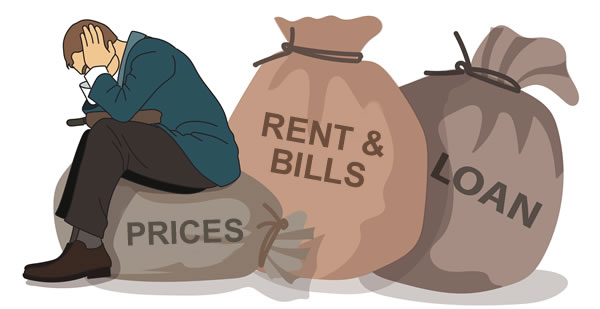 It’s become harder to get a payday loan and other high cost credit in 2022.
It’s become harder to get a payday loan and other high cost credit in 2022.
Many lenders have gone under because of having to pay refunds for affordability complaints. Others stopped lending or cut back on it because of Covid or because of the cost of living crisis this year.
So where can you go if you need credit and you know you will be refused by high street banks?
And if you realise that there is no way you can afford high interest rates and you don’t want to get stuck in unaffordable debt?
Contents
Get a loan from a non payday lender?
You can divide the alternatives to payday lenders roughly into four sorts.
BNPL – free but unregulated
If you are 100% sure you only have a temporary financial problem and things will soon get better, then you can do a lot worse than use Klarna, Clearpay or one of the other new BNPL lenders.
They aren’t regulated, which can be dangerous… BNPL lenders don’t have to make any checks that the credit is affordable for you.
But when you can repay them easily on time then you may not have any problems. Remember though, it can be hard to keep track of multiple purchases owed to several lenders.
However about 4 out of 10 BNPL borrowers report having been unable to repay an item on time and having to pay it off using other credit, such as a credit card or an overdraft. So if you start using BNPL casually as a convenience, this can be a slippery slope into even more debt.
The good – ethical lenders
Even if you haven’t got a great credit record, it may still be possible to get credit from a local credit union or ethical community lenders. They tend to adopt a more personal approach, rather than “computer says no”.
Community Development Financial Institutions (CDFIs) are local community lender community lenders:
- you can put in your details into the Finding Finance page which will say if there are any CDFIs near you;
- many of them incorporate a simple benefit check in their credit applications, as there are millions of people who are entitled to benefits such as Universal Credit, Pension Credit and Council Tax Support who are not claiming them;
- they make it easy to change your loan payment dates or get a payment holiday if it is needed.
As an example, look at Fair For You which allows you to pay weekly for white goods and furniture.
You can find your local credit union here. Many Credit Unions are small and local, others depend on the industry you work in. For example, TransaveUK is a credit union for workers in the following sectors: Transport and Storage, Health and Social Care, Engineering, Manufacturing, Cleaning and Waste Disposal. It offers loans with an average APR of 24%
Most of these ethical loans aren’t cheap. Without a good credit record, no-one is going to lend you money at 10% interest…
But they are a lot less expensive than payday loans.
The bad – other high-cost lending
I have seen people trapped into borrowing from Morses, Provident and other doorstep lenders for five, ten or more years… at interest rates of hundreds of per cent.
Guarantor loans such as Amigo’s Reward Rate can too easily turn into a nightmare and make it much harder to deal with your debts in the future as you will be desperate to protect your guarantor.
As a debt adviser, I would far rather see a client with payday loans than guarantor loans!
Here are some comments about guarantor loans:
- The loan was originally for £5,000 then a few years later topped up to £7,000. Honestly the worst decision I’ve ever made.
- feel I’ve spent every single penny I’ve ever had on this loan, the worst idea I’ve ever had!
- basically the biggest mistake I have ever made in my life.
Also to be avoided are the high-cost commercial lenders. People often use these to try to consolidate payday loans – but at 30-99% interest rates, these large loans over years trap you into long-term unaffordable debt.
Consolidating debt may make sense at a low interest rate – less than 10% say. But getting an expensive loan usually runs into big trouble – 30% may soundcheaper than your current debt but paying that much for years can still be a disaster.
So if you already have bad credit, consolidation rarely works. Instead talk to a debt adviser.
The terrifying
This is illegal money lending – often called loan sharks.
The man at the corner shop, the new friend on social media, the woman in the school playground…
They may sound friendly, easy and flexible when they offer to help you out with paying a big bill or covering new school uniform costs. But you have no protection at all with these unregulated and illegal lenders. Miss a payment and you may find the money you owe doubles. And then doubles again.
If you have already borrowed from one, you are the victim, you haven’t committed a crime. You can safely report a loan shark and get practical help and support by phoning 0300 555 2222.
Interest-free help
Interest-free £75 loan
Iceland is offering “micro loans” – up to £75 – at no interest in partnership with Fair For You, an ethical lender. The loans come in the form of pre-loaded card and have to be spent at Iceland. You can check if you may be eligible.
From benefits
When Universal Credit or Housing Benefit doesn’t cover your full rent, you may be able to get a Discretionary Housing Payment from your local council. Your local Citizens Advice can help you apply for this and can also check if you are getting all the other benefits you are entitled to.
If you have been on Universal Credit for 6 months, you may be able to get a Budgeting Advance. For Pension Credit and some older benefits such as Income Support, apply for an interest-free budgeting loan using the form here.
In the five week wait until you get Universal Credit, ask for an Advance Payment. This is an interest-free loan that is later deducted when your UC starts being paid.
If your Universal Credit or other benefits have been sanctioned, you can apply for a Hardship Payment at your Job Centre.
Household Support Schemes run by councils can sometimes help families on benefits, low incomes or waiting for a benefits decision/appeal. You may be able to get vouchers to pay for food, fuel or clothing. Or for bigger basic living items such as beds, cookers and fridges. You can’t usually get cash. Contact your local council and ask if there is any help available.
A loan from your family
Work out what you can really afford to repay, don’t be too optimistic about this, and suggest that you set up a Standing Order to repay them. Obviously don’t think of borrowing from your mum if she is struggling to manage on her pension!
Don’t ask someone to take a loan for you. And NEVER ask someone to guarantee a loan for you – don’t make things worse by dragging someone else into your financial mess.
Foodbank vouchers
You can ask your local Citizens Advice, a GP, Social Worker or a Children’s Centre for a foodbank voucher.
Help for students
If you are a student, talk to your college/uni about whether you can get a hardship grant. Payday loans are a disaster for students who have no chance of repaying them and not having to borrow again.
There are some payday lenders that deliberately target students. But they are just as difficult to deal with, don’t be fooled that they are student-friendly just because their website mentions how hard life is as a student.
Find a way to avoid borrowing
Don’t borrow for everyday essentials
Were you pretty much OK up to the start of 2022 but this year you have been battered by rising prices and bills? From food to energy, petrol to rent, and now mortgages, everything has gone up, often faster than your wages.
In this situation borrowing more doesn’t solve your situation and it makes it harder the next month.
Read What help can you get when you can’t pay the bills? That looks at a wide variety of options from cheap broadband to prioritising your debt repayments.
Postpone and plan for the fun stuff
Borrowing only makes sense for large items that are essential. Everything else you need to save up for:
- Christmas happens every year. Many Credit Unions have good savings schemes allowing you to save from January and take the money out in November.
- if you get a three-year loan to pay for a holiday this year, what are you going to do next year when you are still paying for the previous holiday?
- look at cheaper alternatives such as having a holiday at home. Keep that old car for another year. Don’t upgrade your mobile contract, switch to a SIM-only for a year or two.
Boring? Well perhaps, but you know it makes sense…
Struggling with payday loans and other high-cost credit turns out to be very stressful. That’s a lot worse than boring. You are caught in a trap where large amounts of your income is going out in interest each month, so you can afford even less.
End the debt cycle by taking debt advice
Borrowing more money to repay another debt means your debts are getting bigger and harder to tackle every time. You need to stop this cycle of endless borrowing!
You do have alternatives, they may not seem nice but borrowing more is only making things worse.
With a payday loan that you can’t pay without needing to borrow again, phone the lender up and ask to arrange an affordable repayment plan. They aren’t allowed to keep on adding huge interest and other charges because there is a legal limit – called the payday loan cap – which says you can never pay more in interest than the amount you borrowed.
If you have other sorts of debt, could you manage them if the interest was frozen? Read how debt management can help.
A debt adviser can help you look at all your options. Call National Debtline on 0808 808 4000 for advice on what you should do. They are free, confidential and non-judgemental.
Make an affordability complaint
If some of the credit you have had in the past is “unaffordable” then you can complain to the lender and ask for a refund of the interest you paid.
The regulator says that credit is only affordable if you can repay it and still have enough money to pay your other debts, bills and everyday living costs. So if you have been borrowing more because making debt repayments has left you with too little to manage, then this is unaffordable.
How you complain depends on the type of credit you are complaining about:
- payday loans and accounts like Drafty;
- overdrafts that you have been in all or almost of the months for a long period;
- large loans such as 118, Lendable and Everyday Loans. That page also covers car finance such as Moneybarn. And loans from high street banks!;
- credit cards and catalogues where your credit limit was increased too high.
These complaints can take a long while as many lenders just say No, even to good cases, so they have to go to the Ombudsman. So think about getting yourself into a safe financial position while the complaints go through by getting a debt management plan. If you win the complaints negative information is removed from your credit record and your DMP will finish much sooner!

Leave a Reply